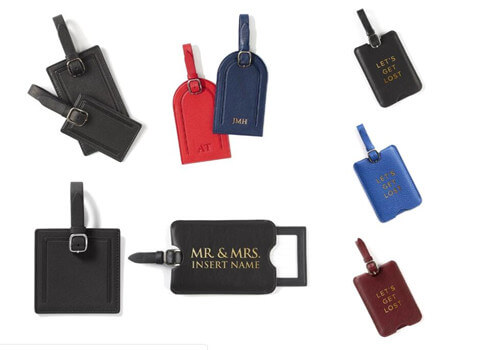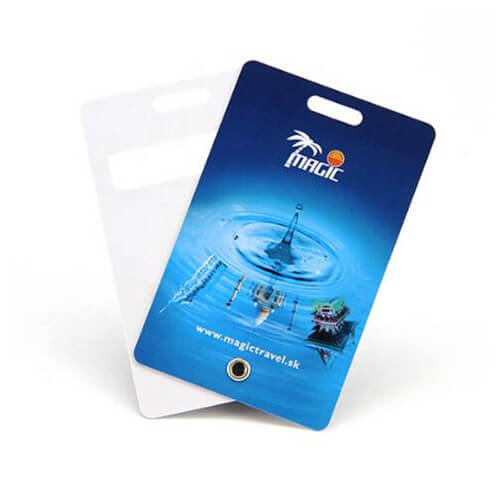RFID is a relatively simple technology that is proving to have multiple uses in today’s modern world. Right now, it is commonly used in the supply and logistics industry, in toll payment, and in IoT applications. In the last few years, RFID use has also started to gain traction in airports around the world.
What is RFID?
RFID is an acronym for “Radio-Frequency Identification”. The device consists of a small chip and an antenna. The chip is capable of carrying data, while the antenna is used to transmit the data. RFID, like a barcode, is a useful tool for tracking and traceability. Unlike a barcode, however, it does not require a scanner with precise accuracy. It can contain a range of information, depending on the application it is used for. For example, RFID tags are used for tracking items along with their supply chain by marking products with RFID tags that contain the style, color, brand name, product code, manufacturing location and more.
RFID luggage tag is more user-friendly than barcodes label in many cases, not to mention that they can contain more information and can generally transmit information within a 20-foot radius.
Lost Luggage at Airports
A SITA Baggage Report 2016 identified that as many as 23.1 million bags in airports are manhandled and misplaced. Why does this happen?
Your Bag is Loaded into the Wrong Airplane
An airport employee places the bag in the wrong conveyor belt which is then loaded into the wrong airplane.
The Wrong Destination
The baggage check-attendant accidentally types in the wrong destination.
You Miss your Baggage at the Destination
This could happen due to several reasons such as you picked up the wrong bag or you are unable to find it at the conveyor belt.
The Label is Damaged
The label on your bag can get damaged during transit.
Many of these issues are human error issues, which can be solved by enhancing the process through technology like RFID.
RFID luggage tag is Better for Tracking
A RFID baggage tag that contains a RFID tag allows an airline to track luggage more effectively. The most common process at this time relies on a barcode system which requires tedious scanning.
Here’s the impact the RFID luggage tag system can have on the airline industry.
For Passengers:
Baggage check-in enabled by mobile apps
Track the baggage and be aware of its location
An easier check-in and simpler process for picking up luggage
For Airports and Airlines
Improved customer satisfaction
Decrease in the number of lost items results in reduced costs
Reduce departure delays
RFID Baggage Tags in the World
RFID baggage tags have already begun to impact the air transportation industry. Here’s how.
The Self-Service Airport:
The idea of a self-service or automated airport is gaining traction worldwide. Airlines are creating automated baggage check-in kiosks that are enabled by RFID technology. The Wall Street Journal did an excellent piece covering the growth of Self-Service Airports.
Delta Invests Million on RFID for baggage tracking
In more recent news, Delta Airlines invested million in baggage tracking technology. Delta is one of the many airlines to do so. Qantas, Alaska, and Lufthansa are just some other airlines which are also investing heavily in this technology.
IATA Recommendation
International Air Transport Association (IATA) has recommended that airports continue to evolve their tracking technology.
RFID clearly has a big role to play in the airline industry, especially for baggage tags. We can’t wait to see which airlines adopt the technology next.
The airline industry is preparing to carry more than 7.8 billion passengers per year.
Over the next few years it is expected that, due to the estimated growth in air traffic, the amount of baggage transported annually - which currently stands at 4.6 billion - will double. As part of its resolution 753, the International Air Transport Association (IATA) has decided to support the global deployment of radio frequency identification (RFID) for baggage tracking. This resolution stipulates that passengers’ baggage must be tracked in real time across key points in the journey (at check-in, boarding, transfers and on arrival).
As a result, airlines have committed to replace, over the coming years, their current baggage tags with new ones integrating RFID technology.
Air France is one of the first global airlines to expand and standardize the use of RFID technology across all of its baggage operations.
The French airline has two key objectives in this project:
Respond to customers' need for information about their luggage and offer them new services;
Improve the identification rate and baggage tracking (punctuality, productivity), and thus reduce associated operating costs.


255.jpg)
